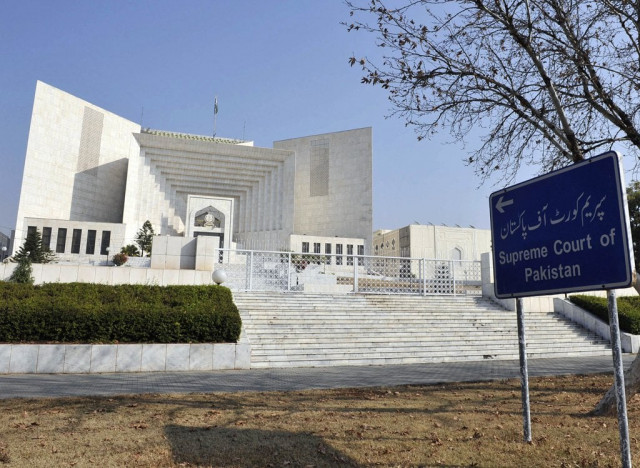Burden of proof always placed on prosecution: SC
19-page ruling speaks of significance of Article 121, QSO and Section 342, CrPC

The Supreme Court of Pakistan. PHOTO: AFP
“Therefore, the court, in the first instance, is to discuss and assess the prosecution evidence, in order to arrive at the conclusion as to whether or not the prosecution has succeeded in proving the charge against the accused on the basis of its evidence,” says a 19-page ruling authored by outspoken judge Justice Syed Mansoor Ali Shah over the significance regarding Article 121, Qanun-e-Shahadat Order (QSO) and Section 342, Pakistan Code of Criminal Procedure (CrPC).
The apex court, in its judgment of a murder case, says that in a case where the accused has not taken any specific plea, i.e. self-defence, grave and sudden provocation, etc. or has not produced any evidence in his defence, the court should decide the question of success or failure of the prosecution on the basis of the evidence presented by the prosecution alone.
The judgment says that the burden shifts upon the accused under Article 121 of the QSO to prove his defence plea, only when a prima facie case is made out against him by the prosecution on the basis of its evidence. If the prosecution fails to prove its case against the accused, the question of shifting of burden on the accused does not arise, it adds.
The top court held that if the prosecution fails to prove its case against the accused, the court can take into consideration the statement of the accused under Section 342 CrPC whether in favour of or against the accused; but it must take into consideration that statement in its entirety and cannot select and place reliance on the inculpatory (a statement which attributes liability on the person making such statement) part of the statement only.
“In the last mentioned circumstance, the facts narrated by the accused in his statement under Section 342 CrPC are to be accepted without requiring their proof. The court, however, should examine the said facts in order to give due effect to them under the law. The object of such examination is to determine whether or not the facts narrated by the accused constitute an offence under the law or fit into any exception of the offence provided under the law,” the verdict says.
The court also observed that an admission or confession made in statement under Section 342 CrPC, which is improbable or unbelievable, or is not consistent with the overall facts and circumstances of a case, do not have any probative value and thus it cannot be relied upon by the court to reach a conclusion.
Facts of the case
The court has highlighted significance of both provisions in this murder case.
Ali Ahmad (the appellant) murdered his sister, Rabia Khalil and her paramour, Raheel Arif, in his own house in Toba Tek Singh, in the wee hours of the night (3am) on April 23, 2006.
He was booked for offences punishable under Section 302 of the Pakistan Penal Code (PPC). After regular trial, he was convicted and sentenced to rigorous imprisonment for 10 years by the trial court.
Upon appeal by the complainant, the high court set-aside the judgment of the trial court, and convicted the appellant under Section 302(b), PPC and sentenced him to imprisonment for life.
The high court relied on its ruling in an earlier dispute (Ameer case), saying that it was the case of honour killing and not of grave and sudden provocation, without fully appreciating the difference between the two.
The apex court, however, says that in case of honour killing the act of murder is well thought out, calculated and pre-mediated, while in case of grave and sudden provocation the act is committed on the spur of the moment with no prior deliberation or planning.
It said that reliance by the high court on Ameer case was misplaced as the murder in that case was pre-meditated. “Our culture and social values reflected in the jurisprudence developed so far is that an act of illicit sex with a female family member of the offender is considered sufficient to cause provocation so grave and sudden that it would deprive the offender of the power of self-control,” says the apex court judgment.
The Supreme Court, setting aside the high court order, restored the trial court judgment. It, however, revised the appellant’s sentence to 15 years.



















COMMENTS
Comments are moderated and generally will be posted if they are on-topic and not abusive.
For more information, please see our Comments FAQ